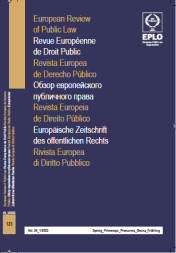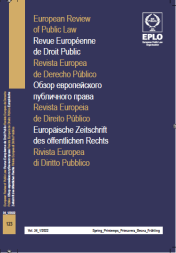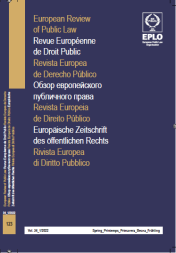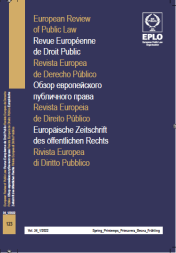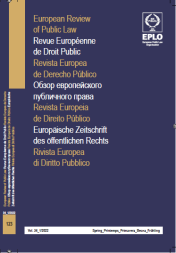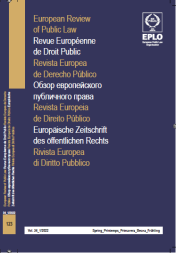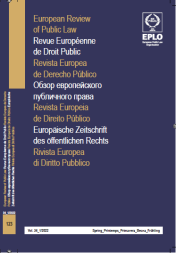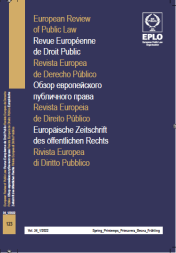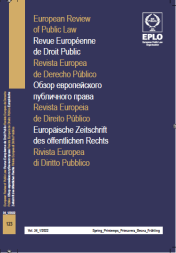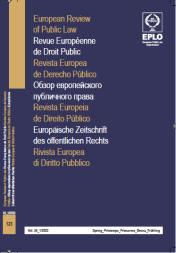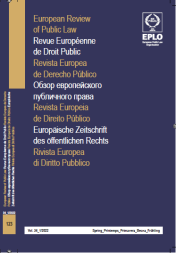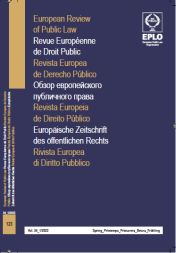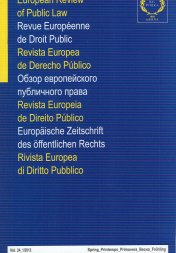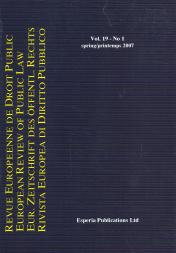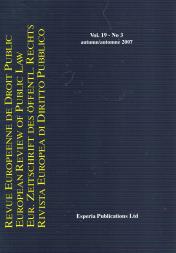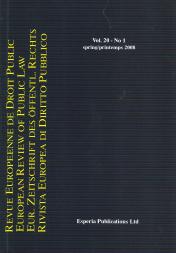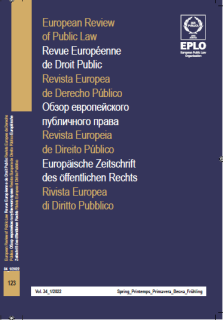
ERPL
vol. 34, no 1, spring/printemps 2022 (123)
This ERPL issue comprises the proceedings of the EGPL Annual Reunion 2021, which was held from the 10th to the 12th of September 2021, on the subject “The State as Protector/Guarantor of Last Resort”.
The issue follows the themes of the Conference sessions, that is: “General Introduction: The State in Emergency Situations”; “Emergency Powers and Rights/Duties of Citizens”; “The Response to the COVID-19 Pandemic” whereas it also comprises the General Conclusions, and several Contributions on these subjects, as well as a paper in the context of the Workshop held within the framework of the Conference.
The issue starts by a brief introduction on the development of states of emergency as an opportunity to reflect upon the adaptation of institutions in terms of organization of powers, upon the balance between security and freedoms and upon the respective functions of States and supranational structures.
Under the first heading, the following paper maintains that the fact that many of the current crises are not managed in a special legal framework (“state of emergency”) but in the normal form of law, threatens to contaminate the latter, with repercussions also for the management of normal situations. The paper then asks what criteria can be used to distinguish special situations from normal situations and takes a critical view of the currently observed attempt to constitutionalize exceptional administrative law.
The next paper under this heading deals with the legal orders’ reaction to the pandemic: countries reacted on the basis of a not necessarily homogeneous and coherent composite of norms. As time has been passing, several different phases in the fight against the pandemic, each of them inspired by different principles, public goods and needs, have followed one another. Also, the role of State powers varies, and it is for lawyers to try and design a valid framework, which could be a useful tool for other health emergencies to come.
The last paper under the heading of the General Introduction maintains that the COVID-19 pandemic woke up the State from its “dormant” status. Thus, the State is regaining an important and major role as guarantor of last resort, especially in the fields where the European Union (at this stage of European integration) does not and cannot act as such: external security, internal security and public order, safety of its citizens, State economic interests in the so-called “strategic” sectors. At this stage of European integration the State remains the guarantor of last instance, for at least three reasons: the special allegiance between the State and its citizens, the national solidarity and the possibility to use emergency powers.
Under the heading “Emergency Powers and Rights/Duties of Citizens”, the first paper warns about the danger of the gradual consolidation of a constitutional mithridatism, which, as a consequence of the limitation of a number of fundamental rights due to the measures to combat the coronavirus pandemic, will make us addicted to the idea of losing our fundamental rights for the sake of protecting superior legally protected rights. This paper intends to deal with the question of whether the suspension of fundamental rights in order to tackle the coronavirus pandemic can threaten the health of democracy and of how we defend our legal culture.
The second paper under the same heading examines the legal management of the health crisis generated by the Covid-19 pandemic based on two quite different national approaches and experiences, namely the inclination of Sweden to give precedence to Soft Law and of France to Hard Law. The in-depth comparative study of the legal frameworks laying down the duties and responsibility of citizens for fighting the pandemic enables the discovery of a large and intricate range of rules tending to blur traditional legal categories. The paper discusses furthermore the conditions for citizens’ acceptance and implementation of their duties.
The first paper under the next heading “The Response to the COVID-19 Pandemic” contains a brief presentation and analysis of the legal framework governing the single monetary policy in the euro area amidst the current pandemic crisis. After the General Introduction in Section A, it reviews the developments relating to the implementation of the single monetary policy since the outbreak of the pandemic, discussing, inter alia, the PELTROs, the PEPP and the amendments introduced to other APPs in Section B. Section C deals with the new (2021) monetary policy strategy of the European Central Bank (ECB) and the developments in relation to the ECB and the interbank interest rates; finally, Section D sets out some considerations relating to the impact of monetary policy on financial stability.
The second paper under the same heading deals with Germany’s regime of action proving itself capable of combating the Corona pandemic. The flexibility of the principle of proportionality gave state action in this extraordinary situation room for maneuver and freedom of design in different directions and with different purposes. Therefore, the principle of proportionality has proved its worth as a criterion for the legality of restrictions on fundamental rights, also and especially in times of a pandemic.
The next paper reflects the oral conclusions presented at the end of this EGPL Conference, dealing in particular with two questions: the legal problems posed by the practice of triage (i.e. selecting which patients can be attended when not all of them can be treated) and the ambiguities of the “state” as guarantor of last resort. The conclusions also include a reference to the author’s professional experience during the pandemic.
In the Section of Contributions to the different subjects of the Conference, the first paper outlines the relationship between science and public decision, highlighting the risk that the democratic institutional system runs when pluralism is not adequately guaranteed in the public debate on scientific statements.
The second paper in this Section highlights the fact that, despite some measures being taken in The Netherlands limiting the freedom of assembly under the pressure of the COVID-19 pandemic, places of worship have been and are currently exempted from measures, including the obligation to wear a face mask and show a valid ‘COVID-pass’ at the entrance. It therefore discusses the evolution of the Dutch COVID-19 measures with respect to places of worship, and places some critical remarks at the former and current COVID-19 policy as well as a pending legislative proposal, which includes the possibility to close places of worship in case of a COVID-19 outbreak.
The next paper, referring to the enormous disruption to the operation of the EU-wide economy caused by the ongoing COVID-19 pandemic, whose effects are likely to be felt for many years in the future, maintains that the gravity of the COVID-19 pandemic across the EU warrants a unified anti-fragility campaign across the EU and its trading partners, which may require adding a whole new public health care layer to the EU common market infrastructure possibly based on the extended version of the EU Digital COVID-19 certificate.
As in case of emergency public authorities can take extraordinary measures, affecting the procedures for the adoption of administrative rules and decisions, the last paper in this Section studies five typical manifestations of this process in view of the measures taken to cope with the health, economic and social crisis brought about by COVID-19: expediting, streamlining, staying, replacing, and removing administrative procedures.
The last paper in this ERPL issue deals with the theme of the Workshop that took place in the context of the Conference on the theme “Behavioural Insights, Law and Good Administration: Nudging and the COVID-19 Pandemic”. This paper synthetically presents some basic ideas on the importance of behavioural insights and developments in recent decades in the field of behavioural law and behavioural economics, explaining the bounded rationality of human beings, the concept of biases and nudging and their consequences for law and governance, using the COVID-19 Pandemic as a paradigmatic example of an area where nudges can be used.
This ERPL issue concludes with a table of Information.
Summary
Foreword [IN ENGLISH AND FRENCH]
B. Mathieu, State and Health Crisis – A Brief Introduction [IN FRENCH] (3 pp.)
M. Nettesheim, Liberal Constitutionalism in Times of Crisis and Emergency [IN ENGLISH] (17 pp.)
S. de la Sierra, The State in Emergency Situations: An Uncertain Legal Framework Comprised of Fragments, and an Asymmetrical Balance of Powers [IN ENGLISH] (16 pp.)
M. Gnes, Wars and Fights against Pandemics: The Re-emerging Role of the State as Guarantor of Last Resort [IN ENGLISH] (18 pp.)
S. Vlachopoulos, The Danger of Constitutional Mithridatism - Fundamental Rights in Times of a Pandemic [IN ENGLISH] (15 pp.)
Ch.V. Gortsos, The Evolution of Monetary Policy in the Euro Area since the Outbreak of the Pandemic Crisis [IN ENGLISH] (43 pp.)
M. Brenner, Challenges to the Constitutional Law Caused by Corona [IN ENGLISH] (15 pp.)
L. M. Díez-Picazo, The State as Protector/Guarantor of Last Resort – General Conclusions [IN ENGLISH] (8 pp.)
G. Clemente di San Luca, Brief Considerations about the Relationship between Science and Public Decision [IN ENGLISH] (9 pp.)
I. van Soolingen, Behind God’s Doors – Critical Remarks regarding the Protection of Religious Activities in Places of Worship during the COVID-19 Pandemic in The Netherlands [IN ENGLISH] (14 pp.)
O. Zaichuk / Y. Zaichuck, EU COVID-19 – A Window into the Future: Scenarios for Legal Evolution [IN ENGLISH] (18 pp.)
L. Arroyo Jiménez, Administrative Procedures and Emergencies under Spanish and EU Law [IN ENGLISH] (22 pp.)
J. Ponce Solé, Behavioural Insights, Law and the Covid-19 Pandemic [IN ENGLISH] (27 pp.)
Information [IN ENGLISH AND FRENCH]













